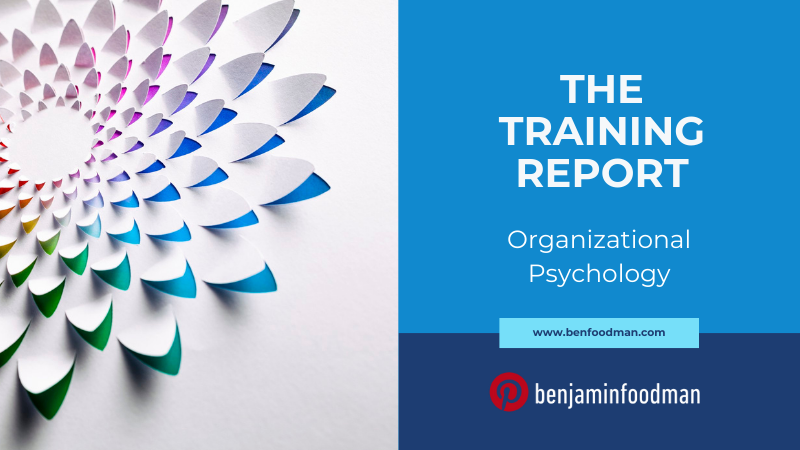Organizational Psychology - How To Improve Teamwork & Communication With Sport Psychology Techniques
About the Author
Ben Foodman is a licensed psychotherapist & performance specialist. He owns his private practice located in Charlotte North Carolina where he specializes in working with athletes to help them overcome mental blocks (the yips), PTSD, ADD / ADHD and achieve flow states through the techniques of Brainspotting & Neurofeedback. If you are interested in services, use the link here! Enjoy the article below!
Introduction: Sport Psychology Strategies For Teams & Organizations
When I speak with business leaders, I am often asked about some of the sport psychology strategies that athletes use to achieve peak performance outcomes. This is because there is a general recognition that many of the psychological skills used in sport competition can successfully transition to other performance and non-sport teams (e.g. tactical athlete populations, music groups, etc.). While there are many excellent approaches that organizations and teams can utilize, I believe they should focus on strategies that enhance trust & rapport.
For this issue of the Training Report I want to explore sport psychology strategies that can enhance trust and rapport through any type of organization. First, we will clearly define what trust & rapport is. Next, we will explore the connection between trust, rapport and winning habits. Finally, we will review specific strategies that leaders within different teams and organizations can adopt in their daily practices. With that being said, let’s dive into how we can define trust & rapport.
Part I. How To Define Building Trust & Rapport
Having a standardized definition or strategy on how to build trust & rapport within a team can vary from organization to organization. While trust and rapport are very similar, there is a key difference between the two. Some definitions state that rapport is focused on building a strong connection whereas trust is built on a reputation of consistency and reliability. You need both to occur simultaneously to build strong teams, but there is no question that the beginning of every relationship will be won or lost based on how strong the initial connection is.
Why would building rapport and trust be a fundamental sport psychology skill? In the world of sports performance, motivation is a key metric for success. Even athletes that compete in individual sport events still have relationships with coaches and support staff that are critical towards their success. Because sport psychologists and Certified Mental Performance Consultants recognize the value of these terms and how motivation is influenced by the rapport between team members, they spend a great deal of time trying to develop skills to enhance them. But how exactly does this translate to sport performance championships?
Part II. How Building Trust & Rapport Wins Championships
Teams and organizations coalesce around share goals and a long-term vision. If individuals have a common interest, more can be accomplished in making that interest a reality if individuals work together. But behind all of this, the relationships that drive these outcomes have to be founded on trust and rapport. If athletes and coaches feel that a genuine, authentic connection has been established, then all individuals are open to different forms of communication and strategies because a genuine interest in one another is apparent through the rapport process.
But creating strong foundations for trust is like putting down the final layer of cement to secure these outcomes. In order to establish trust, all individuals in these relationships need to establish behaviors that are consistent, reliable, predictable, and produce positive outcomes that drive movement towards outcomes that benefit the overall vision of the group. Basically, athletes AND coaches have to show up and bring the right kind of reliable energy and work ethic every time they meet. So what are some strategies athletes and coaches can use to enhance building trust and rapport?
Part III. Sport & Organizational Psychology Strategies For Building Trust & Rapport
First, in order to build rapport there are 2 key approaches that must be present in order to make this aspect of relationships a possibility: being your authentic self & listening.
Authentic Self - being your authentic self means being ‘naturally’ you. In today’s climate of social media temptations, people often times only try to present the ‘highlight’ version of themselves. This is fake, and most people can sense this from a mile away. In order for any relationship to work, you need to be who you are and not someone else. Even if the relationship is not a right match, it’s better to move on and find individuals who want to support your authentic self.
Listening - having excellent listening skills is critical towards developing a solid rapport with individuals. Athletes and coaches initially think that having good listening skills is too simple or too easy…this could not be further from the truth. Having good listening skills means that you are genuinely trying to understand another human’s point of view, absent of judgement, while also understanding how others feel emotionally about situations or different types of information.
One of the key strategies for building trust that sport psychologists love to use is establishing a shared set of goals. I have written about this in previous Training Reports, but essentially all individuals need to be aware of the outcomes goals, performance goals, and process goals. Once the team is in agreement on those goals, they can use the process goals as a type of ‘compass’ to help them towards achieving the team’s shared vision. So long as all of the leaders and team members are checking in on their progress towards achieving process goals, this will significantly enhance the environment of trust!
Note To Reader:
If you are an athlete reading this segment of the TRAINING REPORT, hopefully this content was helpful! I put the Training Report together because I felt like many of the discussions on issues such as the Yips/mental blocks, strength training & other subject matter on athlete performance concepts were really missing the mark on these ideas (e.g. how trauma is the direct cause of the Yips). If you are interested in learning more, make sure to subscribe below for when I put out new content on issues related to sport psychology & athlete performance! Also, if you are looking to work with a mental performance specialist, you are in the right place! USE THIS LINK to reach out to me to see if my services are the right fit for your goals!
ARE YOU ON THE LIST?
Make sure you’re signed up to Ben’s mailing list to receive news & updates on new strategies in sport psychology, upcoming workshops & products. Don’t wait, sign up now!


















